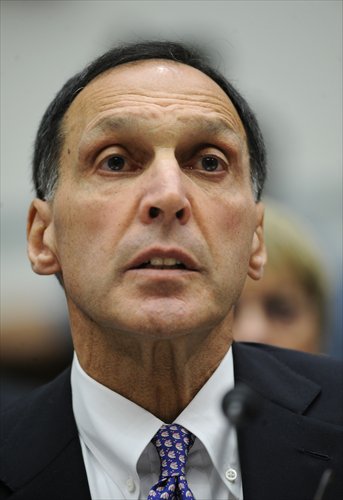Lessons learned?
Lehman Brothers’ former CEO Richard Fuld discusses financial risk

Richard Fuld, former Lehman Brothers CEO Photo: CFP

The headquarters of Lehman Brothers on September 14, 2008 in New York City Photo: CFP
Editor's Note:
Richard Fuld is one of the most legendary and notorious of Wall Street magnates. He was famously the CEO of Lehman Brothers when it declared the largest bankruptcy in history in 2008, a moment widely regarded as the start of the global financial crisis. Fuld was later listed as one of the top 25 people to blame for the financial crisis by Time magazine.
After the Lehman collapse he started a new financial counseling firm called Matrix Advisors, and is now seeking to help Chinese companies go public in US capital markets. Fuld spoke to Global Times reporter Zheng Yizhen in an exclusive interview on Tuesday, talking about the Lehman crisis and whether there is a risk of such a crisis in China.
GT: Some say that the main cause of the financial crisis in 2008 was enterprises' greedy appetite for capital, while some say that capitalism itself was to blame. What do you think was the cause?
Fuld: I say publicly that I take full responsibility for all the decisions I made at Lehman Brothers. I made those decisions with the best information I had at that time. It's easy to look back and wonder if I could or should have [done something different].
But all I can tell you is that on September 12, 2008, Lehman Brothers was not a bankrupt company. [On September 12, the US Treasury and Federal Reserve refused to bail out Lehman Brothers. On September 15, Lehman Brothers filed for bankruptcy protection].
Without getting into specifics about how it was handled, I think all banks had too much leverage at that time. But prior to that, the US government had worked very hard to enable the middle class to take on additional debt to purchase homes. The moment that the interest rate went up, people were no longer able to afford the interest on their mortgages.
I don't want to get into all the stuff about Lehman Brothers, because that would be inappropriate. But I think a number of firms have already cleaned up a lot of their balance sheets. I think the regulators have very little understanding about the interconnectivity of the banks, and more importantly, about the banks' business in the global market place.
GT: Do you think a case similar to Lehman Brothers could happen in China? Do you think China is vulnerable to this kind of crisis, or has it safeguarded itself?
Fuld: I don't think there is a crisis like 2008 blowing in China. I think China understands the pitfalls of what happened in 2008.
The Chinese authorities have already decreased the leverage that might hurt the system.
Plus, Chinese regulators have a much clearer view of the interconnectivity of banks today, and they have a good handle on this, at least according to the conversations that I have had.
Concerning the Chinese housing market, I believe there was more of a housing bubble about a year and a half ago. The financial authorities focused on it, they started to cut back and regulate it.
In addition, there are some noises saying that China's economic growth is decreasing. I really have to laugh at that. No matter what, China's GDP is still growing at a rate of over 7 percent, which is way ahead of most other countries.
GT: What are the major risks facing China's economy?
Fuld: First, it's the banks and the loans they have. Will they get repaid? Second, it's the insurance companies. Will their investment generate enough profits? Will they have enough cash to pay for all the claims they might face?
Third, it's about the migration of millions of people to the cities. Will enough jobs be created, and will people have enough money to buy homes? Fourth, a lot of money is leaving China. If the amount continues to increase, it might be a threat in the future. Last, foreign exchange - the currency could face problems, given the current situation of oil prices and exports, and its value versus the US dollar.
GT: I heard your firm is trying to merge with Chicago Mercantile Exchange and hoping to turn it from a commodity exchange into a stock exchange. One of the purposes of this would be to help Chinese firms gain a listing on this platform. What kind of service will it provide for Chinese firms? What are the obstacles facing Chinese firms who want to get listed in the US market?
Fuld: I can't comment on the Chicago Mercantile Exchange at the moment. For the second question, I don't think Chinese companies understood what was expected of them when floating in the US. Consequently, they fell into a number of holes. Some of them had inadequate accounting and legal standards.
But the press blew the problems out of proportion. Because of that, the exchanges shut their doors to Chinese companies. The Securities and Exchange Commission has toughened standards, but I don't think this was solely aimed at Chinese companies.
GT: Some media reports ranked you as the best CEO of all time, while some others ranked you as the worst. How you do see your role in the financial crisis? Have you learned from it, and can you win trust from Chinese partners?
Fuld: Do I have a choice? I appreciate that the media allows different views. I actually learned a lot from the crisis, such as the value of friendship, of strong partners, and of picking yourself up and moving on.
But at the end of the day, there is only one person you have to be comfortable with. That's the person you look at in the mirror. The good news is I am very happy with that person. But I am very sad about what happened to Lehman Brothers, and to all those people that were unfairly affected by Lehman's demise.
Whether Chinese partners will trust me or not is up to them. I haven't spoken to enough people yet, but the people I have spoken to embraced me very warmly. I think a lot of people have a clear understanding of what transpired in the US, with Lehman, with me and the regulators. I am going to leave it at that.